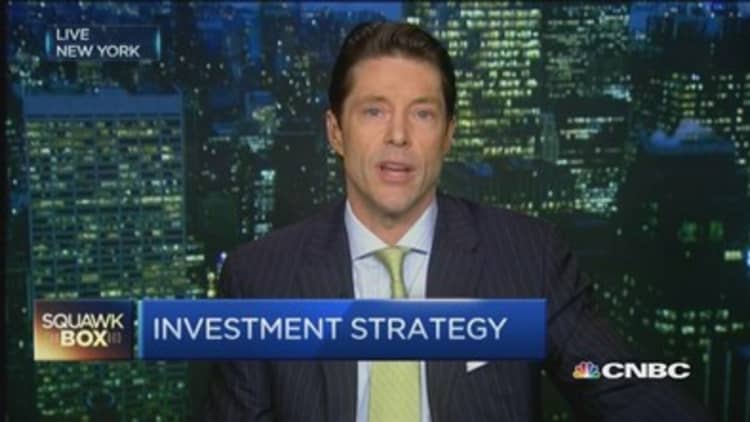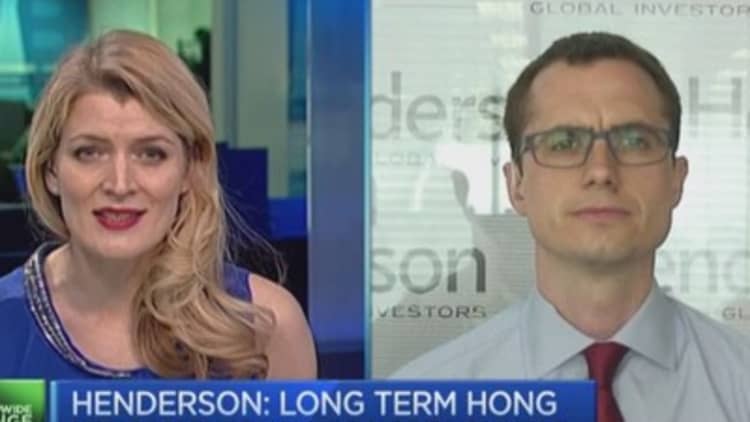Hong Kong stocks are a winning trade, investors say, as worries over pricey A-shares and favorable policy announcements send mainland investors bargain hunting down south.
The benchmark Hang Seng Index shot up 4 percent to its second straight seven-year peak on Thursday, playing catch up to the recent string of seven-year highs. Year-to-date, Shanghai is up 23 percent and the Hang Seng 11 percent higher, but between the two analysts say Hong Kong offers better value.
"China stocks are no longer cheap. The momentum is in place, so let's see whether it starts moving into bubbly valuations," Roger Tan, CEO of Voyage Research, told CNBC
HSBC agrees, noting that 40 percent of Shanghai-listed companies have price-to-book (PB) ratios in the range of 1X-3X. For Shenzhen-listed firms, that range increases to 5x-10x. By contrast, nearly 40 percent of Hong Kong companies have a PB below 1X, and 32 percent have a PB of 1X-2X. A low PB suggests that a stock is undervalued.
H-shares are also more attractive on a forward price-to-earnings (PE) basis, according to IG. Since March 2014, the CSI 300 has increased from 8.11X to 15.6X, while H-shares have gone from 6.3X to 9.33X, which is still relatively cheap, the spread-betting firm said in a note on Thursday.
Arbitrage trades
This valuation gap has presented a juicy arbitrage opportunity for Chinese money managers. The Shanghai-Hong Kong Stock Connect saw record turnover on Wednesday as Chinese investors used their entire daily quota for the first time.
"While mainland shoppers appear to be losing some of their enthusiasm for going shopping in Hong Kong, it is likely that retail investors on the mainland will soon be snapping up H-share bargains in large numbers," HSBC wrote in a report.

The disparity in prices [between the two markets] is primarily a result of the inefficiencies of the barely five-month-old Stock Connect, explained Nicholas Teo, CMC market analyst. "Without a free and completely liberated access to both sets of investors, huge imbalances remain between the supply and demand surrounding both categories. With this being the case, a spread in price may offer a fascinating trading concept," he said.
Easing restrictions
New action from regulators also appears to be spurring the resurgence in mainland buying.
The China Securities Regulatory Commission (CSRC) removed barriers for mainland money managers to buy H-shares last week. "The idea is not to hurt the A-share market, but to lower the valuation discrepancy between markets and spread risk," said Chris Weston, IG's chief market strategist.
Read MoreHong Kong's labor pool may be about to shrink
Moreover, the China Insurance Regulatory Commission recently allowed mainland insurance firms to invest in Hong Kong's Growth Enterprise Market for the first time.

HSBC expects additional supporting policies to be announced in the near future, including the introduction of margin trading for mainland retail investors and a removal of the 500,000 renminbi minimum stock account balance, which should increase participation in southbound Stock Connect trading.
However, not everyone believes mainland players are at the center of the action.
"Despite the recent extension of Hong Kong-Shanghai Connect to include mainland fund managers, our discussions with brokers [on Wednesday] suggest it was foreign fund manager buying, rather than mainland Chinese," noted Mark Matthews, head of research Asia at Bank Julius Baer.

